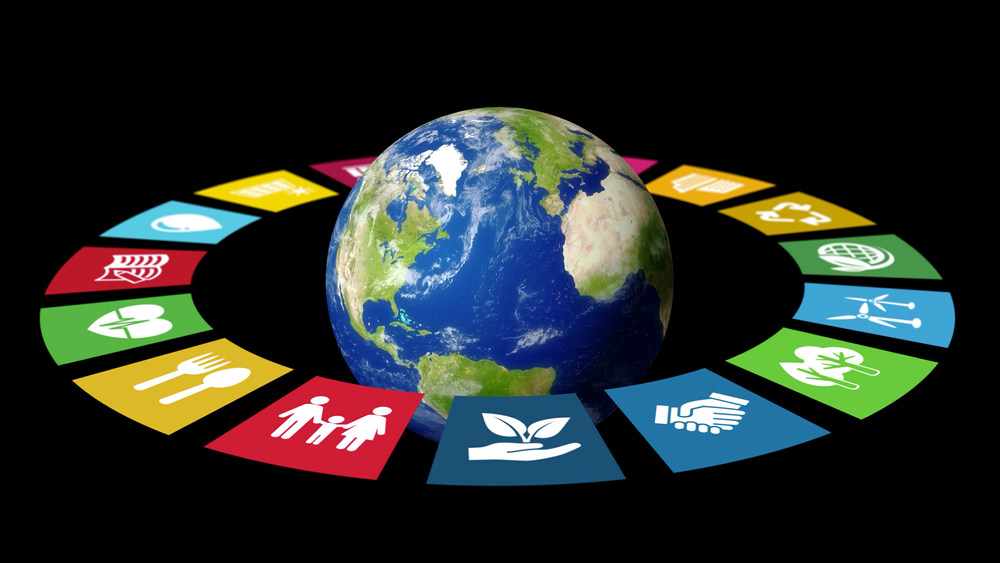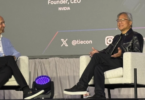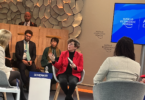During this week’s United Nations General Assembly, amid the news that no major economy is on track to meet the Paris Climate Accord, the World Economic Forum convened its annual Sustainable Development Impact Summit., with the aim of accelerating the U.N.’s 2030 Global Goals.
The scale of the challenges requires an unprecedented level of cooperation across borders and industries and increased collaboration with startup and scale-ups.
The Summit sought to act as a catalyst. It highlighted concrete solutions that can be scaled and some of the innovative technologies and business models developed by the more than 1,300 entrepreneurs on its Uplink open innovation platform, startups and scale-ups in its Technology Pioneers and global innovators communities, and its Scale360° hubs, which bring together leaders in science, policy and business to figure out how to build lasting ecosystems for the circular economy.
Speakers at the conference stressed that governments and corporates must move faster and do more to meet the Global Goals. A flurry of announcements made during the summit illustrate that business has gotten the memo.
Over 20 companies pledged to conserve, restore, and grow more than 2.5 billion trees in over 50 countries by 2030 through the Forum’s 1t.org trillion tree platform. The Forum stressed that the trillion trees goal does not replace net-zero emission programs. Business, industries and cities still need to decarbonize to meet climate targets. To that end, during the summit, the Forum launched a toolbox of solutions to accelerate decarbonization in cities and over 150 industry leaders and organization signed a call to action for shipping decarbonization. The Forum also announced that its Stakeholder Capitalism Metrics initiative is gaining momentum. Over 100 companies have signed up, with over 50 already including the metrics in their 2020-2021 reporting materials. Drawn from existing standards, the Stakeholder Capitalism Metrics provide a set of metrics that can be reported on by all companies, regardless of industry or region. The metrics also offer comparability, which is important for informing ongoing efforts to create a systematic, globally accepted set of common standards for reporting on sustainability performance.
While the carbon footprints of large companies are being increasingly scrutinized , o the summit emphasized the important role that small and medium sized businesses have to play. “SMEs are the backbone of the economy. They represent 98% of companies in some sectors like manufacturing, “ said Francisco Betti, the Forum’s Head of the Platform for Shaping the Future of Advanced Manufacturing and Production. “They can play a major role in boosting economic growth in a sustainable way,” he said, but only if they use technology to adapt.
Investors also have an important role to play. Summit speaker Al Gore, an environmentalist who served as the 45th vice president of the United States from 1993 to 2001, noted that a group of asset managers have pledged that their portfolios will be Net Zero by 2050 at the latest. The assets they manage are worth $43 trillion “ which is about half of all the assets under management worldwide so many in the business world are moving,” he said.
But it is not enough. “We have to stop global greenhouse gases from increasing,” said Gore, who drew a parallel between the COVID pandemic and the climate crisis. “Science and technology have given us solutions to both of these crises, but we have not organized global cooperation to implement solutions quickly enough,” he said.
Closing The Digital Divide
The same could be said for many of the U.N.’s other Global Goals. The pandemic demonstrated how critical it is to access healthcare, education, and financial services online. But, despite decades of efforts to close the digital divide some 47% of people do not benefit from the Internet. Indeed, two billion people still lack access to healthcare, 1.7 billion remain unbanked and 265 million children have no access to education, Cost, not coverage, is the critical barrier to connectivity.
In low-income counties, home to 650 million people, mobile broadband is 18 times more expensive than in developed counties, as a proportion of average income.
During the summit the EDISON Alliance launched the 1 Billion Lives challenge to accelerate digitally inclusive solutions for the health, finance and education sectors by creating new types of alliances. Initial commitments announced by American Tower, Apollo Hospitals,, Mastercard, MTN, Qualcomm, Verizon and Western Union, among others, were announced during the conference.
“Progress has been made but we can see that the business models that brought us this far are reaching their limit,” Derek O’Halloran, the Forum’s Head of the Platform for Shaping The Future of Digital Economy, said in an interview with The Innovator. “All the actors are beginning to recognize that their own programs will only get us so far. We need to think about this from a systemic point of view and identify the collaborations that can make this ecosystem work.”
The idea for the alliance is not to recreate the wheel, said O’Halloran. Great initiatives from business, international organizations and civil society already exist, he said. “The most important thing is to get people to commit to bringing services to communities that don’t currently have it and help them find the right partners and commitments that, if successful, can impact the lives of several hundred million people.”
O’Halloran talked about how the Forum, in partnership with the World Bank, GSMA and the International Telecommunications Union, put together a set of recommendations in just four weeks that have been shared with Finance and ICT ministers in 170 countries. “We can move mountains when we take half a step back and engage on the bigger topic,” he said. “It is a solvable problem. We can tackle this. There is no reason we can’t get everyone connected by 2030, so let’s do it.”
Using Tech To Improve Healthcare, Child Welfare And The Environment
During a panel entitled ‘Fast Tracking Progress Through Data And AI, moderated by The Innovator’s editor-in-chief, participants outlined specific ways that technology can help in other ways. Paula Ingabire, Rwanda’s Minister for ICT and Innovation, talked about how, in partnership with the government, a local company used drones to capture images of mosquito breeding hotspots in Rwanda’s marshlands and then are analyzed by an AI model. Based on the AI analysis, the government then contracts with the company to send the same drones to spray these marshlands to prevent the spread of malaria. The solution can be easily scaled, she said, to sub-Saharan Africa ,where malaria is the main cause of death and a major threat to child health.
Speaker Charlotte Petri Gornitzka, Deputy Executive Director of Unicef, talked about the launch last month of the Children’s Climate Risk Index (CCRI), which uses data to generate new global evidence on how many children are currently exposed to climate and environmental hazards, shocks and stresses. A composite index, the CCRI brings together geographical data by analyzing exposure to climate and environmental hazards, shocks and stresses; and child vulnerability. The CCRI helps to understand and measure the likelihood of climate and environmental shocks or stresses leading to the erosion of development progress, the deepening of deprivation and/or humanitarian situations affecting children or vulnerable households and groups. The ability of data to measure the impact on children will hopefully serve as a further reminder of why it is important to take responsibility for climate change, she said.
Kimberly Lein Mathison, General Manager of Microsoft Norway, who will assume a new role as CEO of the Forum’s Centre for the Fourth Industrial Revolution for the Ocean in the coming months, detailed how the Forum and partners have created a data collaboration platform to gain ocean-related environmental insights. The platfor started with shipping, combining data from an identification system that tracks 200,000 ships as they move across the globe. The data was fed into a recognized machine learning model and used to calculate what the emissions were likely to be. The choice was to wait a long time for every ship to be outfitted with sensors or to use AI to make the most of the data available today. “We have put that data out there and we attracted a lot of interested people who want to make that data even better,” said Lien Mathison. The gathered data helps with transparency and compliance and should serve as a catalyst for the transition of ships to cleaner fuel, she said.
Decarbonizing Global Supply Chains
At the summit more than 150 leaders representing the entire maritime value chain called on governments to work together with industry to deliver the policies and investments needed to reach critical tipping points in decarbonizing global supply chains and the global economy. The Call to Action for Shipping Decarbonization was developed by a multi-stakeholder taskforce convened by the Getting to Zero Coalition, a partnership between the Global Maritime Forum, the World Economic Forum and Friends of Ocean Action. Members of the task force include Cargill Ocean Transportation, City, the COP26 Climate Champions team, the Energy Transitions Commission, Lloyd’s Register, Port of Antwerp, Torvald Klaveness, Trafigura, Yara and UMAS.
Ships transport around 80% of global trade and account for about 3% of global greenhouse gas (GHG) emissions. In 2018, the U.N.’s International Maritime Organization adopted an initial GHG strategy. It aims to reduce international shipping’s total annsal GHG emissions by at least 50% of 2008 levels by 2050.
But shipping is only one element of the global supply chain. The world wastes one-third of the food produced and the environmental footprint is enormous, noted speaker Geraldine Matchett, Co-Chief Executive Officer and Chief Financial Officer of Royal DSM, a Dutch multinational corporation active in the fields of health, nutrition and materials.
She proposed four fixes:
* Connect small scale startups to larger players to accelerate technological innovation.
* Increase private sector investment in biotech and science that can radically impact the production of food.
*Create more partnerships between governments, the private sector and NGOs to accelerate concrete actions
* Connect across the value chain to understand which innovations might scale across regions.
No Time To Waste
Summit speaker Inger Andersen, Executive Director of the U.N.’s Environment Program, stressed that there is no time to waste. “For 30 years the IPCC [Intergovernmental Panel on Climate Change] has come out with ever greater precision about what is happening and what we need to do, and yet, we listened but we didn’t hear, and didn’t take action,” she said. “Now it is really one minute to midnight. The Secretary General has come out and said that this is code red for humanity… We are meeting in New York City right now. We are convening a food system summit and convening an energy summit but Glasgow (the UN Climate Change Conference in Scotland taking place November 1 to November 12) has to succeed. It is not enough to kick the can down the road. It is not enough to make promises. We said in Paris we would come back with more ambitious NDCs [Nationally Determined Contributions]. Now is the time to deliver them with clear time marks. 2022 will be a very decisive year. If we have not hit what we need to do in Glasgow, we are in dire straits. But.we can do this. That is the good news. The technology is there. The private sector and finance sector are leaning so. Let’s get this done.”
IN OTHER NEWS THIS WEEK
FINANCIAL SERVICES
JPMorgan Takes On British Rivals With Launch Of Digital Bank Chase
JPMorgan is challenging British rivals on their home turf with the Sept. 21 launch of its long-awaited digital retail bank, Chase, as part of what the U.S. lender hopes will be a global expansion.The launch marks the first foray into retail banking outside North America by one of the United States’ most dominant lenders, heaping pressure on British incumbents such as Lloyds, Barclays, NatWest and HSBC which are already battling low interest rates and upstart digital rivals.
FOOD AND AGRICULTURE
Bill Gates’ Green Tech Fund Bets On Silicon Valley Farming Robots
As California struggles with another crippling drought, a Silicon Valley startup that believes robots can grow produce more sustainably said Wednesday it raised $50 million in a funding round led by Bill Gates’ Breakthrough Energy Ventures.Iron Ox uses robots that are integrated with a hydroponic system which it says consumes 90% less water than traditional farms,
MOBILITY
GM Invests In Chinese Autonomous Driving Startup
General Motors said September 23 that it will invest $300 million in Chinese autonomous driving startup Momenta to develop self-driving technologies for future models in China, its first such tie-up in the world’s biggest car market.Momenta is among the few companies that hold a permit for gathering high-definition maps in China, a key tool in autonomous driving technologies. It is working with automakers to develop mass-production vehicles with self-driving functions to gather real-time data.
RETAIL
Inside Amazon’s Plans To Reinvent The Department Store
The Wall Street Journal reported leaked information about Amazon’s planned department stores. Sources told the Journal Amazon will aim to boost its apparel sales by offering shoppers a chance to try on clothes from its own private-label brands in technology-fueled dressing rooms. The department stores, which the online shopping company could open next year, will primarily function as a place for Amazon to sell T-shirts, jeans and other items from its own labels, as well as a mix of outside brands that sell clothing on its website. Sources told the Journal Amazon wants to see if the department stores can improve the brand recognition of its apparel while addressing some of the irritants of both online and bricks-and-mortar clothes shopping. One idea that has allegedly been tested is for customers to scan QR codes of items they want to try on by using a smartphone app and for associates in the store to gather the items and place them in fitting rooms. Once there, customers could ask for more items using a touch screen, which might be capable of recommending additional clothing based on the pieces shoppers liked. The rooms could use sliding doors for associates to bring more clothes without seeing shoppers. Robots or other forms of automation could eventually be deployed in the stores.
CIRCULAR ECONOMY
Battery Startup Raises $70 Million To Grow Closed-Loop Battery Supply Chain
Battery Resources, a startup that’s developing a closed-loop approach to lithium-ion battery materials, has raised $70 million in mid-round funding to scale its commercial operations across two continents. The company, which is based in Worcester, Massachusetts, doesn’t just recycle batteries. It has also engineered a process to turn that recycled material back into critical battery materials — specifically, nickel-manganese-cobalt cathodes and purified graphite, a material used in anodes. It intends to sell those materials right back to the battery manufacturer.This latest round saw participation from new investor Hitachi Ventures, as well as existing investors Orbia Ventures, Jaguar Land Rover’s InMotion Ventures, Doral Energy, At One Ventures, TDK Ventures and Trumpf Ventures.







